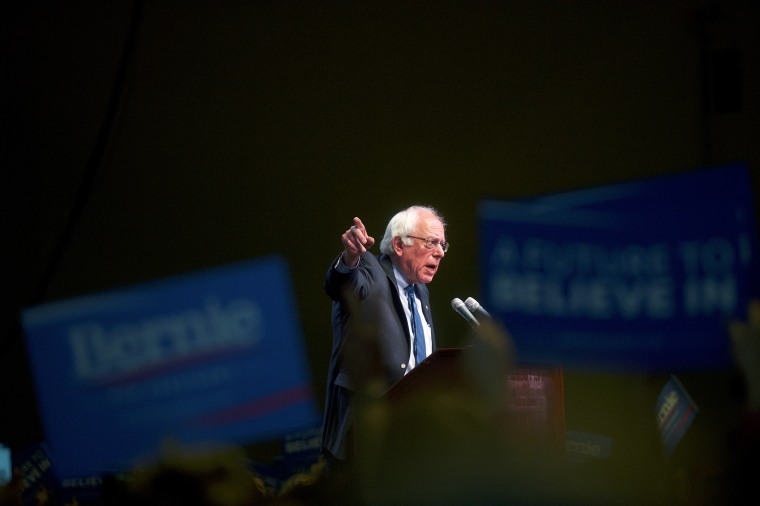On Friday, Bernie Sanders repeated a familiar complaint: "It's strange and undemocratic that 450 superdelegates backed [Hillary Clinton] even before we got into the race."
This isn't exactly the easiest case to make. For one thing, it's really not that odd for many Democratic insiders to throw their support behind the former Secretary of State, senator, and 2008 runner-up before the primaries got underway. For another, when it comes to the challenges facing the Sanders campaign, superdelegates are practically irrelevant: the senator is trailing among pledged delegates. His deficit among superdelegates is the least of his troubles.
But perhaps most important is the Sanders campaign's broader strategy: the senator and his team are committed to a plan in which they'll ask party insiders to give Sanders the Democratic nomination, even if he comes in second. Given this dynamic, it would seem the senator has an incentive to impress superdelegates, not complain about them.
And yet, over the weekend, Sanders went much further down a confrontational road. The Washington Post reported:
If you want to make a politician really, really angry, endorse their primary opponent. That's exactly what Bernie Sanders did Saturday to Democratic National Committee Chairwoman Debbie Wasserman Schultz. "Clearly, I favor her opponent," Sanders said in an interview with CNN's Jake Tapper set to air today.
Yesterday, the Sanders campaign, which, with few exceptions, hasn't done much to help Democratic candidates, went so far as to launch a fundraising campaign to help the DNC chair's primary rival in her Florida district, Tim Canova.
As the Washington Post's report added, "You can be certain that Wasserman Schultz has spent the past 12 hours making sure that every one of her colleagues is aware of what Sanders has done. If he is willing to do this to me, don't fool yourself into thinking he won't do it to you too, she'll argue."
And that gets at the heart of Sanders' dilemma: he's identified the people who can rescue his candidacy, and he's poking them with a pointed stick.
Whether you love Sanders, hate him, or are somewhere in between, he's no fool. He can do arithmetic as well as anyone else. The Vermonter is well aware of the fact that there's no realistic scenario in which he wins each of the remaining primaries and caucuses in lopsided landslides, catching up to Clinton in the race for pledged delegates. It's why Sanders and his top aides have argued for several weeks that they'll pursue an alternate course: winning the nomination by taking their fight to the convention and convincing Democratic officials to override the will of the voters.
It's not the strategy the senator hoped to pursue, but given the primary results, Team Sanders just doesn't have much of a choice.
On its face, the scenario is far-fetched -- why would Democratic insiders deliberately ignore the wishes of Democratic voters? -- but it's even more difficult to imagine given Sanders' latest efforts to infuriate the very people whose help he's seeking.
TPM's Josh Marshall explained the other day, "Sanders has in the last three days essentially declared war on the institutional Democratic party.... But his entire stated strategy is to do well enough in the final run of primaries that super-delegates, the embodiment of the institutional party, decide to drop Clinton and switch their allegiance to Sanders.... You don't gain the acceptance or support of people whose very legitimacy you are currently attacking."
The underlying request is itself pretty audacious: Sanders wants party insiders to overlook election results and elevate the second-place candidate over the first-place candidate based on his "electability" pitch. But how likely is it that Democratic officials will want to do him a history-changing favor while he chastises them?
